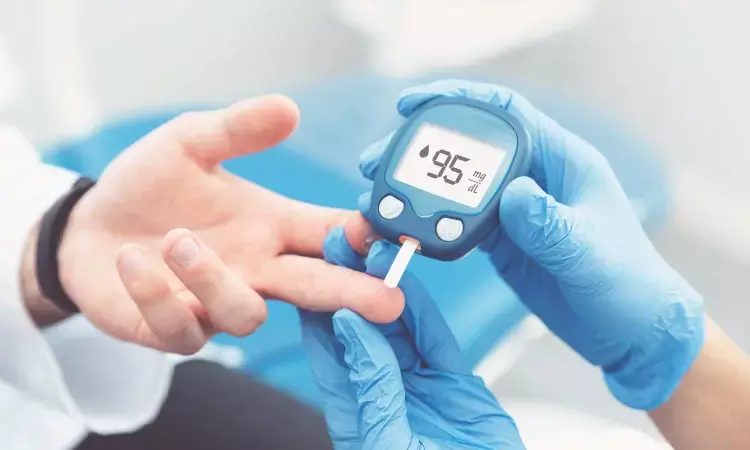- Home
- Medical news & Guidelines
- Anesthesiology
- Cardiology and CTVS
- Critical Care
- Dentistry
- Dermatology
- Diabetes and Endocrinology
- ENT
- Gastroenterology
- Medicine
- Nephrology
- Neurology
- Obstretics-Gynaecology
- Oncology
- Ophthalmology
- Orthopaedics
- Pediatrics-Neonatology
- Psychiatry
- Pulmonology
- Radiology
- Surgery
- Urology
- Laboratory Medicine
- Diet
- Nursing
- Paramedical
- Physiotherapy
- Health news
- Fact Check
- Bone Health Fact Check
- Brain Health Fact Check
- Cancer Related Fact Check
- Child Care Fact Check
- Dental and oral health fact check
- Diabetes and metabolic health fact check
- Diet and Nutrition Fact Check
- Eye and ENT Care Fact Check
- Fitness fact check
- Gut health fact check
- Heart health fact check
- Kidney health fact check
- Medical education fact check
- Men's health fact check
- Respiratory fact check
- Skin and hair care fact check
- Vaccine and Immunization fact check
- Women's health fact check
- AYUSH
- State News
- Andaman and Nicobar Islands
- Andhra Pradesh
- Arunachal Pradesh
- Assam
- Bihar
- Chandigarh
- Chattisgarh
- Dadra and Nagar Haveli
- Daman and Diu
- Delhi
- Goa
- Gujarat
- Haryana
- Himachal Pradesh
- Jammu & Kashmir
- Jharkhand
- Karnataka
- Kerala
- Ladakh
- Lakshadweep
- Madhya Pradesh
- Maharashtra
- Manipur
- Meghalaya
- Mizoram
- Nagaland
- Odisha
- Puducherry
- Punjab
- Rajasthan
- Sikkim
- Tamil Nadu
- Telangana
- Tripura
- Uttar Pradesh
- Uttrakhand
- West Bengal
- Medical Education
- Industry
Does self-stigma impact blood glucose control in people with type 1 diabetes?

There has been an increase in research on diabetes-related stigma and its association with glycated hemoglobin (HbA1c) over the past years. However, little is known about the association of self-stigma with HbA1c in persons with type 1 diabetes.
Individuals with chronic medical conditions may experience self-stigma, or negative beliefs, emotional reactions, and behaviors towards themselves as a result of their illness.
Researchers have found a link between self-stigma and glycated hemoglobin (HbA1c)-a marker of blood sugar levels-in adults with type 1 diabetes.
The iresearch has been published in the Journal of Diabetes Investigation.
The study included 109 adults in Japan with type 1 diabetes who completed questionnaires that generated scores based on a self-stigma scale. Although the findings support a link between self-stigma and sub-optimal HbA1c, additional studies are needed to show whether this is a causal relationship.
“We focused on this issue through clinical experiences with people with type 1 diabetes, whose glycemic management improved markedly by social supports of eliminating diabetes-related stigma. Although the finding of an association between self-stigma and HbA1c is significant, further longitudinal research is required to determine whether self-stigma leads to sub-optimal HbA1c,” said corresponding author Yukiko Onishi MD, PhD, of the Institute of Medical Science, Asahi Life Foundation, in Tokyo. “This research does support and highlight the importance of eliminating self-stigma when treating people with type 1 diabetes.”
The researchers concluded that self-stigma is associated with HbA1c among adults with type 1 diabetes. Our study suggests that treatment of diabetes should be provided to persons with type 1 diabetes with considerations that HbA1c is associated with self-stigma.Addressing self-stigma might be as equally essential as measuring HbA1c in evaluating glycemic outcome among individuals with type 1 diabetes.
Reference:
Shoko Hamano, Yukiko Onishi, Yoko Yoshida, Toshiko Takao, Tazu Tahara, Takako Kikuchi, Toshiko Kobori, Tetsuya Kubota, Masahiko Iwamoto, Masato Kasuga published: 25 January 2023 https://doi.org/10.1111/jdi.13963
Dr Kamal Kant Kohli-MBBS, DTCD- a chest specialist with more than 30 years of practice and a flair for writing clinical articles, Dr Kamal Kant Kohli joined Medical Dialogues as a Chief Editor of Medical News. Besides writing articles, as an editor, he proofreads and verifies all the medical content published on Medical Dialogues including those coming from journals, studies,medical conferences,guidelines etc. Email: drkohli@medicaldialogues.in. Contact no. 011-43720751


